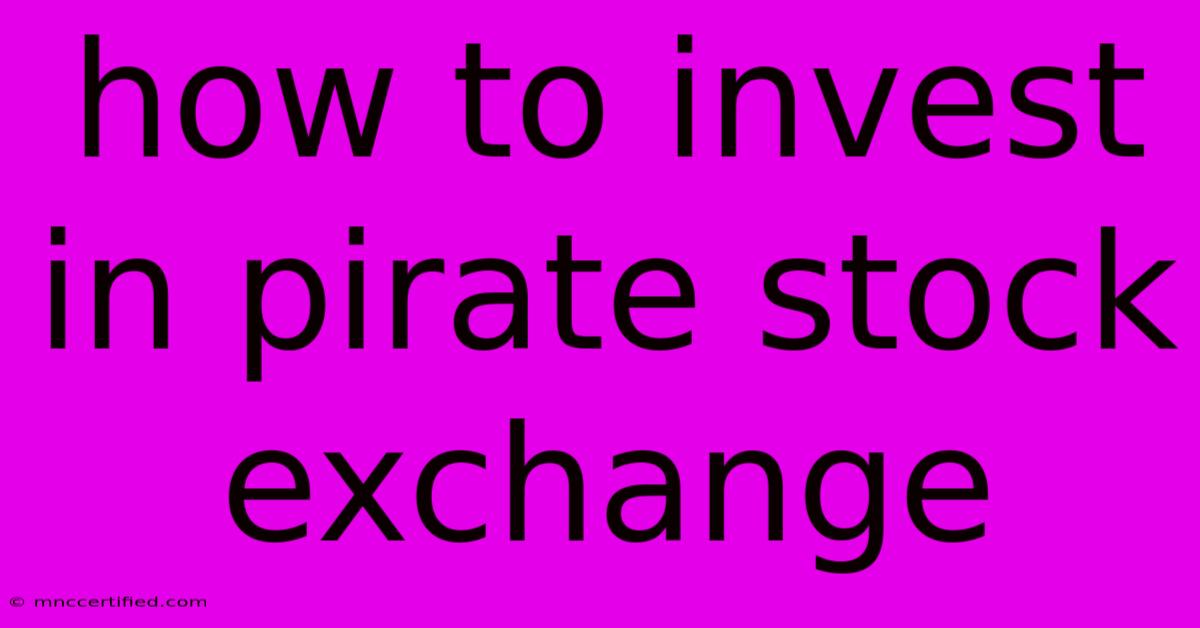How To Invest In Pirate Stock Exchange

Table of Contents
Ahoy, Matey! How to Invest in the Pirate Stock Exchange (It's Not What You Think)
The idea of a "Pirate Stock Exchange" might conjure images of peg-legged traders haggling over shares of stolen treasure. But in reality, the term "pirate stock exchange" is a playful metaphor used to describe a decentralized, unregulated financial market. This isn't your typical Wall Street operation; it's a frontier of finance where innovation and risk go hand-in-hand.
So, how can you navigate this intriguing, albeit volatile, world? Let's hoist the sails and set course for the uncharted waters of the "Pirate Stock Exchange."
What is the "Pirate Stock Exchange"?
The "Pirate Stock Exchange" is a catch-all term for various financial markets that operate outside traditional regulatory frameworks. These include:
- Decentralized exchanges (DEXs): These platforms allow for peer-to-peer trading of cryptocurrencies and other digital assets without the need for a centralized intermediary. Popular examples include Uniswap and PancakeSwap.
- Over-the-counter (OTC) markets: These markets facilitate trades directly between two parties, bypassing the need for a formal exchange. They often deal in more illiquid or specialized assets.
- Non-fungible token (NFT) marketplaces: These platforms are used to buy, sell, and trade digital assets that represent ownership of unique items like art, collectibles, or virtual real estate.
Why "Pirate" Stock Exchange?
The "pirate" label is used because these markets operate outside the traditional, regulated system. They offer a greater degree of freedom and less stringent oversight. This can be attractive to investors seeking:
- Anonymity: Some platforms allow for anonymous trading, which can appeal to individuals concerned about privacy or seeking to avoid regulations.
- Innovation: These markets are fertile ground for new financial instruments and technologies.
- High-risk, high-reward opportunities: While the potential for profit can be significant, so too is the risk.
Navigating the Uncharted Waters
Investing in the "Pirate Stock Exchange" isn't for the faint of heart. It requires a high level of risk tolerance, technical expertise, and a thorough understanding of the underlying assets. Here are some key considerations:
1. Due diligence is essential: Research the platforms, projects, and assets thoroughly. Look for red flags, such as a lack of transparency, unrealistic promises, or dubious founders.
2. Security is paramount: These markets are particularly vulnerable to scams and hacks. Take steps to protect your assets, including using strong passwords, two-factor authentication, and reputable wallets.
3. Diversify your portfolio: Don't put all your eggs in one basket. Spread your investments across different assets to mitigate risk.
4. Understand the regulatory landscape: While these markets operate outside of traditional regulations, they are not entirely lawless. Be aware of the potential legal and tax implications of your investments.
The Pirate Code: A Summary
Investing in the "Pirate Stock Exchange" offers exciting opportunities for early adopters and those seeking to explore the frontiers of finance. But it comes with significant risks. Remember:
- Risk is inherent: These markets are volatile and unpredictable.
- Transparency is vital: Look for platforms and projects with clear information and a proven track record.
- Due diligence is non-negotiable: Research thoroughly before investing.
By understanding the risks and navigating these markets carefully, you may find yourself sailing toward a treasure trove of opportunities. However, remember: "Pirate" stock exchanges are not for the faint of heart!

Thank you for visiting our website wich cover about How To Invest In Pirate Stock Exchange. We hope the information provided has been useful to you. Feel free to contact us if you have any questions or need further assistance. See you next time and dont miss to bookmark.
Featured Posts
-
La Liga Live Stream Us Friday November 8th Guide
Nov 09, 2024
-
Jack Daniels Bonded Tennessee Whiskey
Nov 09, 2024
-
Heretic Movie Ending Director Insights
Nov 09, 2024
-
Latest Denver Snow Forecast Totals Through Date
Nov 09, 2024
-
De Santis Trump Staff A Growing Divide
Nov 09, 2024